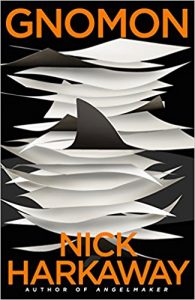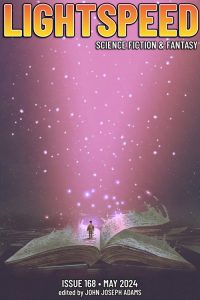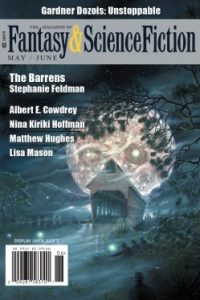Ian Mond reviews Gnomon by Nick Harkaway
 Gnomon, Nick Harkaway (William Heinemann 978-1785151279, £14.99, 704pp, hc) November 2017. (Knopf 978-1524732080, $28.95, 688pp, hc) January 2018.
Gnomon, Nick Harkaway (William Heinemann 978-1785151279, £14.99, 704pp, hc) November 2017. (Knopf 978-1524732080, $28.95, 688pp, hc) January 2018.
I know I’m late to the work of Nick Harkaway. I’ve meant to read his fiction since the publication of The Gone-Away World back in 2008, I even bought the book, but, for whatever reason, never cracked open the covers. I was planning on picking up Gnomon, until I saw it was over 700 pages long and decided I’d wait for the next one. Social media, though, convinced me otherwise and I’m truly pleased it did. To quote Michael Dirda’s astute review of the novel for the Washington Post, Gnomon dazzles.
The novel’s opening section provides no warning of the roller-coaster, madcap ride that’s about to follow. We are introduced to a near future England where mass surveillance, administered by a powerful artificial intelligence called the Witness, has become the norm. At some point, every citizen has their thoughts scanned, in an attempt to ferret out criminal inclinations. In other words, Harkaway dishes up a garden-variety dystopia where the right to privacy has been abolished. One point of difference is that democracy flourishes through the form of direct representation; everyone has the option to vote on any choice facing the society.
Diana Hunter, a throwback to the days when citizens were free to keep secrets, dies suddenly in custody as her thoughts are scanned. Inspector Neith, our protagonist, is brought in to investigate Hunter’s death. Although the prose in this opening section is matter of fact, almost mechanical, there’s a claustrophobic feel to Neith’s investigation, a sense that some force, one not linked to the AI, is watching her. It’s strange and unsettling, and just as the story moves up a gear with the appearance of an enigmatic stranger, an impossibility in a world where everyone is accounted for, Harkaway abruptly shifts the narrative onto a new track.
We are now introduced to Constantine, a banker who survives a close call with a great white shark in the Mediterranean. Constantine’s story couldn’t be more different from Neith’s: we’ve gone from 1984 meets Raymond Chandler to a cross between The Big Short and The Wolf of Wall Street. And just as we’re coming to terms with this tonal shift, and the bizarre revelation that confident, arrogant Constantine has been infected by a meme of some sort, one that takes the form of a shark, we find ourselves in the fifth century – of all places – witnessing the world through the eyes of Athenais, a brilliant alchemist who also happens to be the once-mistress of Saint Augustine. That’s not our final stop. Once we’re done with Athenais – her story involves an impossible murder in an impossible chamber that she may have, impossibly, created – Harkaway drops us in the mind of Berihun Bekele, an Ethiopian artist who was once ordered to paint the portrait of Emperor Haile Selassie.
What links these disparate narratives? Well, they would appear to be the memories of Diana Hunter, scanned from her mind before she died. Why is a woman from near-future England reliving the lives of a Greek banker, a Roman alchemist, and an Ethiopian artist? That would be telling. Part of the joy of this magnificent, wild novel is joining these threads together. (And I haven’t even touched on Gnomon itself, what it means, what it is, how it’s represented in the novel, and how it filters through each narrative).
Story aside, what does link these characters are the themes that Harkaway explores. Gnonom is a novel that deals passionately with human rights, privacy, political corruption, and the excess of capitalism. In other words, it’s a political novel. These days it’s almost a crime to classify a science fiction novel as having an agenda, but Gnomon wears its ideology of human freedom and liberty on its sleeve. As we weave between the different narratives, always coming back to Inspector Neith’s journey down the rabbit hole, we are asked to question and consider the double-edged sword of technology: how it provides opportunity but also has the potential to remove the possibility of choice; how it can make us more compassionate and also strip away our humanity. These are the questions of today, of right now, and reading them in such an ambitious context, where the ideas and concepts come thick and fast, makes for a profound and exciting experience.
This review and more like it in the June 2018 issue of Locus.
 While you are here, please take a moment to support Locus with a one-time or recurring donation. We rely on reader donations to keep the magazine and site going, and would like to keep the site paywall free, but WE NEED YOUR FINANCIAL SUPPORT to continue quality coverage of the science fiction and fantasy field.
While you are here, please take a moment to support Locus with a one-time or recurring donation. We rely on reader donations to keep the magazine and site going, and would like to keep the site paywall free, but WE NEED YOUR FINANCIAL SUPPORT to continue quality coverage of the science fiction and fantasy field.







